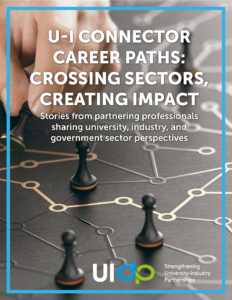Industry-trained engagement managers overcome ‘cultural conflict’ with universities
Excerpted from the January 2022 issue of University-Industry Engagement Advisor. UIDP members can view the entire issue here.
A clear trend has emerged in industry engagement offices, where leadership hiring is decidedly in the direction of those coming out of industry as opposed to academia. The new industry-groomed faces bring with them a natural question for their university employers: How much of a challenge do they face in assimilating to — and perhaps altering — the clear cultural differences between university life and the faster, more cut-throat world of corporate America? How do they get their new teams on board and successfully implement programs that may be quite different than what their new staffs are accustomed to?
As a recent session during UIDP Connect 2021 titled The New Corporate Engagement Officer and additional conversations with corporate engagement managers show, those cultural differences are stark — and yet these industry-trained leaders have appeared to thrive in their new environments.
Industry, noted Cherise Kent, associate dean for industry engagement in the Rutgers University School of Arts and Sciences, “signifies command and control; they fashion performance-based goals that flow down. They focus on quarterly goals and deadlines.” Kent is one of the new breed of industry engagement execs, having held business development roles in biotech with mid-sized pharma companies and then with Johnson & Johnson.
In academia, she continued, “there is a shared mission at research universities, but faculty is focused on projects, teaching, graduate students, and getting grant submissions. There’s not so much of a shared element [with industry engagement], which can make it challenging to move projects across schools and units; there are a lot of silos.”
“The big difference is that companies are profit-driven, versus universities, which are mission-driven,” added fellow panelist Todd Cleland, PhD, who recently retired as senior director of corporate relations at the University of Washington. “Companies try to make money for shareholders, with a short-term focus quarter to quarter. There is lots of depth, but not breadth,” he observed. Prior to 2010, Cleland worked at Hewlett-Packard for 22 years in engineering and business development.
“Academics are mission-driven, with [a focus on] education and research for the public benefit,” Cleland added. “Instead of a few projects for months or years at a time I have many, with lots of breadth but less depth. Unlike at corporations, I am not a technical expert; I have a large number of stakeholders. Universities are relatively flat, with many silos. They are run by professors; the entrepreneurial ones need to go out and raise money. They do not view the chair or dean as their real boss, and it can be hard to drive initiatives across the institution and get all the silos on the same page — whereas in a company the buck stops at the VP level.”
Despite those obvious challenges, “my preference in hiring industry-facing corporate engagement professionals is to lure them from industry,” says Mark Nolan, who at the time of the interview was associate vice president for business engagement and strategy at Carnegie Mellon University. In January, he took the position of associate vice president for corporate engagement at Georgia Tech.
“For 20 years I’ve said the same thing,” adds Nolan, who worked in industry until 1999. “I tell people, ‘Thank you for accepting this position. The skills and techniques you learned in your private sector experience are so important in your work. Over the next two years you will be frustrated that you’re not able to move as quickly as you want. You may want to quit; I hope you don’t because the skills you’ve learned will become important.’” Nolan hired both of his directors of business engagement from industry — one from Northrop Grumman, the other with experience in sales and marketing positions with start-ups.



